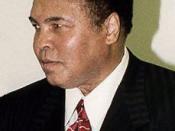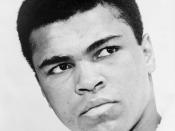When We Where Kings
Documentary studies by Tristan
The documentary, When We Were Kings, is the story of Muhammad Ali's return to Africa to regain his title as heavyweight boxing champion of the world from George Forman. As the filmmaker follows the fight to Africa, we see the build up to the championship fight as well as a connotative story developing regarding the nation of Africa. With the use of actuality footage, archival footage and constructed interviews, the director, Leon Gast, has structured this film to build up to the championship fight, 'Rumble in the jungle'. He has used a cinema verite style of documentary to capture the reality and impact of Muhammad Ali.
The documentary opens with footage of ABC sportswriter Howard Cosell saying: "The time may have come to say goodbye to Muhammad Ali because, quite honestly, I don't think he has a chance." This is followed by Ali's rebuttal: "Howard Cosell, you told everybody I don't have a chance, you told everybody I don't have a prayer.
Well chump, all I need is a prayer coz if that prayer gets to the right man, not only will George Foreman fall, but mountains will fall!" The debate continues with a slowly developing montage of rebuttals and self grandiosing. This introduces the theme of Ali's ambition to beat the world champion. In using a professional sports writer's doubt in Ali, the filmmaker creates a doubt in the viewer's mind of Ali's ability to succeed, developing controversy and stimulating further viewing of the documentary.
Regularly, throughout the documentary, the filmmaker uses interviews of important people, including festival coordinators and Ali's coaching staff. By using these breaks of actual footage, the comments from sports people, such as sportswriter Norman Mailer and Ali's biographer Thomas Hauser, contrast the portrayal of...



Nice
Good job explaining how the filmaker position and the veiwer feel about the documentary! Good Job!
1 out of 1 people found this comment useful.